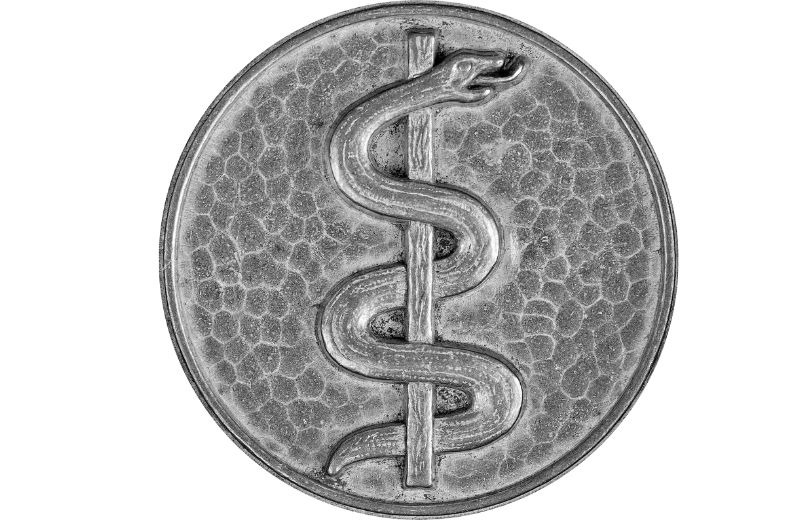Asclepius, a fascinating figure in Greek mythology, holds the title of the god of medicine and healing. His story intertwines divine powers, the art of healing, and dramatic conflicts that have left a lasting impression on the symbols we see today, especially within the field of healthcare. Read on to explore the life, powers, and enduring legacy of Asclepius.
Jump to:
- Who Was Asclepius?
- What is the Story of Asclepius?
- The Rod of Asclepius: Symbolism and Meaning
- The Family of Asclepius: His Daughters and Their Roles
- The Temples of Asclepius: Early Centres of Healing
- Asclepius in Roman Mythology
- Modern Legacy: The Rod of Asclepius and Medicine Today
- Frequently Asked Questions About Asclepius
- Study Greek Mythology for £29
Who Was Asclepius?
Asclepius, also known as Asklepios, was the god of medicine in Greek mythology. His name means 'to cut open,' which connects to his dramatic birth story. From this extraordinary beginning, Asclepius would grow into one of the most well-known healers in mythology.
Recommended for you!
Best SellersWhat is the Story of Asclepius?
The story of Asclepius is a remarkable tale of divine power, healing, and balance in Greek mythology. Let’s explore the key moments of his story.
The Miraculous Birth of Asclepius
Asclepius was born to Apollo and the mortal woman Coronis. After Coronis betrayed Apollo with infidelity, he struck her down in anger but decided to save their unborn child, cutting Asclepius from her womb. This act of both punishment and salvation set the stage for Asclepius’s future as a healer, balancing life and death.
Training Under Apollo and Chiron
Raised by the centaur Chiron and guided by Apollo, Asclepius developed extraordinary skills in medicine. Chiron taught him about herbs and healing, while Apollo bestowed divine knowledge, making Asclepius a master healer capable of curing ailments and understanding the mysteries of life and death.
Asclepius’s Newfound Powers
Asclepius’s skills grew so advanced that he could not only heal the sick but also bring the dead back to life. His power to resurrect made him a worshipped figure among mortals, who flocked to his temples, the Asclepieia, for cures and divine guidance through healing rituals and dreams.
Zeus’s Reaction: The Downfall of Asclepius
Fearing that Asclepius’s power would disrupt the balance between gods and mortals, Zeus struck him down with a thunderbolt, preventing humans from achieving immortality. This decisive act ensured that life and death remained under divine control, marking the end of Asclepius’s mortal influence.
Furious over his son’s death, Apollo retaliated by killing the Cyclopes, the creators of Zeus’s thunderbolts. Eventually, a truce was reached, and Asclepius was immortalised as the constellation Ophiuchus, symbolising his legacy as a healer and his connection to the snake.
The Rod of Asclepius: Symbolism and Meaning

One of the most enduring symbols associated with Asclepius is the Rod of Asclepius—a staff entwined by a snake. This symbol continues to represent medicine and healthcare across the world. But why a snake?
In ancient Greece, snakes were symbols of rejuvenation and healing because of their ability to shed their skin and appear renewed. The rod, meanwhile, represents authority and the power of medicine. The combination of the snake and the staff highlights Asclepius’s role as the god of healing.
This symbol is sometimes confused with the Caduceus, the staff of Hermes, which features two snakes and wings. However, the Caduceus relates to commerce and negotiation, not healing. The single snake on the Rod of Asclepius is the true representation of medicine and healthcare.
The Family of Asclepius: His Daughters and Their Roles
Asclepius’s family played a role in Greek mythology, especially his daughters, who each symbolised different aspects of health:
- Hygeia: The goddess of cleanliness and sanitation, from whom we derive the term ‘hygiene’. Her focus was on prevention and cleanliness as a path to health.
- Panacea: Symbolising the concept of a universal remedy, Panacea represented the belief that every illness could be cured with the right approach or medicine.
- Iaso: Associated with the recovery process and convalescence.
- Aceso: Connected to the healing process itself, specifically how treatment is administered.
- Aglaea: The goddess of beauty, who linked beauty with health.
The Temples of Asclepius: Early Centres of Healing

The temples dedicated to Asclepius, called Asclepieia, were among the earliest examples of hospitals. Located throughout Greece, they were sanctuaries where the sick came for healing rituals. Patients would often sleep within these temples, hoping for a dream sent by Asclepius that would reveal their cure.
Priests, skilled in interpreting these dreams, would prescribe treatments based on these divine messages. This blend of medicine, spirituality, and sleep therapy highlights the holistic approach to health in ancient Greece, where physical, mental, and spiritual well-being were interconnected.
Asclepius in Roman Mythology
In Roman mythology, Asclepius was known as Aesculapius. The Romans continued to venerate him as a god of healing, and temples similar to the Asclepieia were built across the Roman Empire. The symbol of the snake and staff remained central to his worship, showing the enduring influence of Greek medical traditions.
Modern Legacy: The Rod of Asclepius and Medicine Today
The influence of Asclepius extends beyond mythology into the medical field today. The Rod of Asclepius remains a universal symbol for medicine, visible in logos for healthcare organisations and medical services worldwide. It serves as a reminder of the origins of healing practices and the holistic approach that ancient healers like Asclepius promoted.
Frequently Asked Questions About Asclepius
Is there a flower named after Asclepius?
The milkweed plant is scientifically named Asclepias in honour of Asclepius, reflecting his association with healing and medicine. This plant has medicinal properties, which aligns with the god’s legacy.
Did Asclepius have any weaknesses?
While Asclepius was a highly skilled healer, his compassion for mortals led him to overstep his divine boundaries by raising the dead. This act, while showing his kindness, was considered a weakness because it challenged the authority and power of Zeus, ultimately leading to his demise.
Why do some people mistake Asclepius for Jesus?
Some people draw parallels between Asclepius and Jesus due to their roles as healers and their associations with resurrection. However, they belong to entirely different traditions—Asclepius is a figure in Greek mythology, while Jesus is central to Christian theology. Though both are known for miraculous healing powers, their stories and symbolism have distinct origins and meanings.
How do you pronounce the word 'Asclepius'?
The correct pronunciation of Asclepius is "uh-SKLEE-pee-uhs."
Recommended for you!
Best SellersStudy Greek Mythology for £29
Asclepius’ story addresses universal themes—love, healing, betrayal, and revenge. If you’d like to learn more about these myths and explore the characters, symbols, and stories that have shaped Western culture, consider enrolling in the Greek Mythology Diploma Course with Centre of Excellence. For a limited time, you can access the course at a discounted price of £29!












